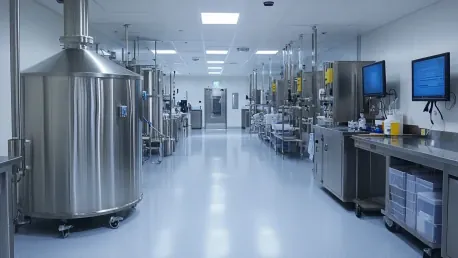The intersection of artificial intelligence (AI) and bioprocess development has paved the way for groundbreaking advancements in the life sciences sector. One particularly exciting development in this domain is the collaboration between Eppendorf SE, a leading life sciences company, and DataHow AG, a trailblazer in AI-driven prediction software. This partnership concentrates on integrating DataHow’s AI-enabled analytics solution, DataHowLab, with Eppendorf’s BioNsight® cloud, a versatile cloud-based monitoring platform, with the explicit goal of reshaping bioprocess development. This collaborative effort is geared toward equipping scientists with sophisticated insights and analytic capabilities that are pivotal for efficiently designing and optimizing intricate bioprocesses. This amalgamation underscores the indispensable role of process data and its inherent complexities, addressing the perennial challenge of data leverage through streamlined integration. Researchers are indeed able to convert this data into actionable insights expediently, propelling the efficiency and depth of their research endeavors.
The Role of Process Data in Bioprocess Development
Process data in bioprocess development is far more than a collection of numbers and metrics; it is the lifeblood of understanding and improving complex biological systems. This critical data encompasses a variety of parameters, including pH levels, temperature, and nutrient concentrations, which collectively inform researchers about how biological entities behave under different conditions. Eppendorf and DataHow’s integration of their technologies exemplifies the effective utilization of this data. By merging BioNsight cloud’s robust monitoring capabilities with DataHowLab’s predictive analytics, researchers can achieve an unparalleled depth of insight. This integration allows for seamless data sharing and contextualization across various devices and locations, ensuring that comparisons made between different data sets are not only meaningful but also valuable for making informed decisions.
The true advantage of this system lies in its capacity to transform raw data into a rich tapestry of actionable insights, thereby empowering researchers to refine their processes with unprecedented precision. This is accomplished through the synthesis of vast amounts of data into a cohesive and comprehensible framework that scientists can use to extrapolate meaningful trends and patterns. As a result, complexities inherent to bioprocesses are mitigated, and the time taken to achieve research milestones is significantly reduced. The seamless integration of data ensures that laboratories, irrespective of their geographical locations, can collaborate effectively, thereby fostering a unified approach to bioprocess development.
Enhancing Bioprocess Efficiency Through Automated Data Preparation
In the world of bioprocess development, efficiency is everything, and one of the critical barriers to efficiency has always been the time-consuming tasks of data cleaning and formatting. Researchers often find themselves spending countless hours processing raw data, a task that not only consumes valuable time but also introduces the risk of human error. Eppendorf and DataHow’s collaboration addresses this bottleneck by providing a solution that automates these tedious tasks. The integration of BioNsight cloud with DataHowLab enables a streamlined approach to data preparation, where raw data is automatically cleaned and formatted for immediate analysis. This not only saves researchers significant amounts of time but also ensures the data’s integrity, allowing scientists to focus on more critical aspects of their research.
With the burden of data preparation lifted, researchers can penetrate deeper into the analysis and decision-making processes. They are provided with ready-to-use, clean datasets that are primed for advanced analytics, facilitating a more thorough exploration of biological processes. Consequently, this automation mitigates the errors that typically arise from manual data handling, ensuring that the conclusions drawn are based on reliable and accurate data. As a result, the overall efficiency of bioprocess development is enhanced, projects are completed more swiftly, and research outcomes are rendered more robust and repeatable.
Democratizing Access to Advanced Analytics
One of the most transformative aspects of the Eppendorf and DataHow collaboration is its focus on the accessibility and democratization of advanced analytics in bioprocessing. Traditionally, such powerful tools and analytics capabilities have been within the purview of data scientists and specialists. However, the integration of DataHowLab with BioNsight cloud brings advanced process data analytics to the fingertips of even non-experts. The software features guidance-enabled workflows that simplify the execution of complex analyses, making it feasible for scientists without a deep background in data science to perform advanced analytics. This democratization of technology facilitates a broader adoption of cutting-edge analytical techniques, fostering innovation and accelerating the pace of discovery.
By enabling a wider array of scientists to use sophisticated analytical tools, this collaboration helps bridge the knowledge gap and empowers researchers to extract more value from their data. Beyond analytics, the integrated platform supports in silico simulations and the optimization of experimental designs, further enhancing research productivity and reducing experimental redundancy. The ability to conduct simulations and optimize parameters before conducting actual experiments saves time and resources, allowing researchers to perfect their methodologies in a virtual environment first. This becomes particularly advantageous in both academic and industrial settings where resource optimization is critical.
A New Standard in Bioprocess Development
The convergence of artificial intelligence (AI) and bioprocess development has paved the way for transformative advancements in life sciences. An exciting example of this is the collaboration between Eppendorf SE, a leading life sciences company, and DataHow AG, a pioneer in AI-driven prediction software. This partnership focuses on combining DataHow’s AI-powered analytics tool, DataHowLab, with Eppendorf’s BioNsight® cloud, a versatile cloud-based monitoring platform. Their goal is to revolutionize bioprocess development by providing scientists with advanced insights and analytic capabilities essential for designing and optimizing complex bioprocesses. This integration highlights the crucial role of process data and its complexities, addressing the challenge of data leverage through streamlined integration. Researchers can now convert this data into actionable insights swiftly, significantly enhancing the efficiency and depth of their research efforts. This collaborative initiative underscores the significant potential of AI-enhanced bioprocessing to propel scientific discovery and innovation.









